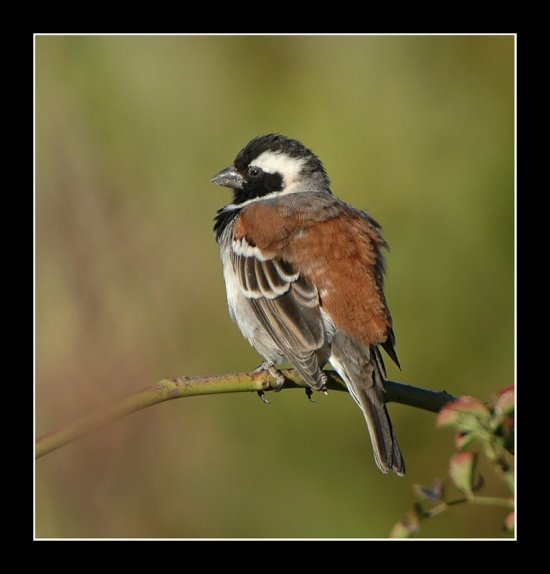(photo of female added) |
m |
||
| Line 1: | Line 1: | ||
;Passer melanurus | ;Passer melanurus | ||
| − | [[Image:Cape_Sparrow.jpg|thumb|550px|right|Photo by Mybs<br />Cedarberg Wilderness area, Western Cape, South Africa]] | + | [[Image:Cape_Sparrow.jpg|thumb|550px|right|Male Cape Sparrow<br />Photo by Mybs<br />Cedarberg Wilderness area, Western Cape, South Africa]] |
| − | [[Image:2007_09_11_Female_Cape_Sparrow.jpg|thumb| | + | [[Image:2007_09_11_Female_Cape_Sparrow.jpg|thumb|450px|right|Female Cape Sparrow<br />Photo by Alan Manson<br />Cedara Farm, Pietermaritzburg, South Africa.]] |
==Other Names== | ==Other Names== | ||
Deutsch: Kapsperling; Afrikaans: Gewone Mossie | Deutsch: Kapsperling; Afrikaans: Gewone Mossie | ||
Revision as of 12:29, 25 January 2008
- Passer melanurus
Other Names
Deutsch: Kapsperling; Afrikaans: Gewone Mossie
Description
14 - 16 cm and 29 g. Head black with broad white semicircles from behind eyes to side of throat. Nape and mantle greyish, merging into rufous or chestnut back and rump.
Habitat
The Cape Sparrow lives in dry areas of Southern Africa like the arid and semi-arid savanna, dry woodland along drainage lines and seasonal watercourses.
Diet
Forages mainly by hopping on ground, but also takes fruits, seeds and nectar directly from plants.
Reproduction
The Cape Sparrow nests singly, or in loose colonies of up to 100 pairs, with up to 15 active nests in one tree. Nests thickly lined with feathers or soft plant material. Laying dates usually from August to March.





